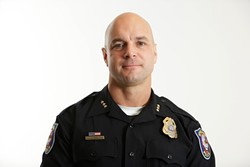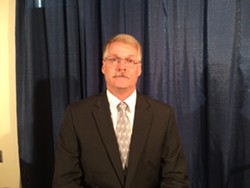The four men competing to be Spokane's next permanent police chief sat through a round of media questions yesterday. The Inlander asked each how they would address The Property Crime Problem.
Earlier this week, Spokane Mayor David Condon called property crimes in Spokane the city's "number one issue," and submitted a proposal to allocate more resources toward addressing the problem, which includes pumping $1.7 million more into the police department. $1.6 million of that would go toward investigations, according to the Spokesman-Review.
Here's what each of the four candidates said:
Craig Meidl
Acting City of Spokane Police Chief
A longtime Spokane cop, Meidl was a member of police leadership as property crime spiked up around 2011 through 2014, and as it began to settle back down in the last two years.
"People are tired of property crimes in the city of Spokane," Meidl says.
Property crimes are one reason why he took Capt. Brad Arleth off the lead of a
"Every single media person I talked with today, just talked about property crimes. We need our precinct captains — who are the tip of the spear for our responses to property crimes — to focus on those property crimes" Meidl says. "The more that's put on their plate, the more distracted they are at focusing on property crimes."
Fighting property crime means working with the community to hit the root causes. The challenge, he says, are resources. He cites the example of a call last summer when he came across a man who admitted he was on meth. Meidl suggested drug rehab. At the time the meth addict was interested.
"The problem is [the program had] a seven-week wait. We don't have a program in place to help support people when they're ready to take advantage of those resources," Meidl says. "By the time an opening comes up in seven weeks, he's not interested anymore."
The community needs the resources to provide more rehab — and other services — to hit the root causes of the issue. The other issue is the lack of resources to pay for detectives — he only has three detectives assigned to work property crimes north of the river, where 68 percent of the calls come from.
As a result, 75 percent of the reported property crimes never get assigned to detectives, Meidl says. The city isn't doing any
"When you have someone who, for example, has $2,000 stolen, and they call the police, and we say, 'we can't work that,' they're understandably frustrated," Meidl says. "What they need to understand is if we work that $2,000 case, we're we're not going to be able to work this $5,000 case. Or we're not going to work this burglary that's tied to three burglaries, and he's committed a net of $6,000 in
The new proposed city budget might help, he says. If it passes it would put more money toward Neighborhood Conditions Officers, which can help address drug houses and other places that property crime can fester.
"We're refining what we do with our civil enforcement unit, which works with abated and nuisance houses and abandoned houses," Meidl says.
Dominic Rizzi
Yakima Police Chief
Back in Chicago, Rizzi was the commander of the robbery unit for an area encompassing five police districts, each the size of Yakima.
"After my tenure, we led the city in clearance rates in robbery and burglary," Rizzi says. "We were able to do a lot of good work."
Part of that, Rizzi says, had to do with using data, analytics, and old-fashioned shoe-leather police work.
"Looking at when [crimes are] occurring," Rizzi says. "Date, times, locations. Identifying individuals who were released from jail or prison. Who lives in the area. Doing a lot of knocking on doors and talking to people. Talking to the officers who work those particular areas or beats."
Analytics are particularly useful to address robberies and burglaries, which can be predicted more easily than gang activity or shootings. But it's important that the data is accurate. For example, he says, if you arrest a crook tied to a bunch of burglaries, taking him out of the equation, it's important to adjust the model to account for that. Otherwise, you could be sending officers to the wrong parts of the neighborhood.
The information flow between the detectives, crime analysts and patrol officers is crucial.
"If you have garbage in, you get garbage out," Rizzi says.
Giving patrol officers detailed information can help tremendously. So can using social media to share and gather information from the public. The crooks themselves can provide important intelligence.
"When you make arrests, do debriefings," Rizzi says. "Talk to people: What else do you know about what's going on in the area?"
Rizzi wants to do a detailed, long-term analysis of the crime numbers in Spokane.
He says there's a huge issue of alcohol and drug abuse in Washington state helping to drive property crime. Addiction, he found, was driving the car prowl problem in Yakima. But by using data and targeting high-impact areas, they've been able to address it, he says.
"We've made some fantastic arrests," Rizzi says. "When you take that person off the street, that's 10 or 20 car prowls that aren't going to occur next week."
John Bruce
Frisco, Texas Police Chief
Bruce suggests a two-pronged approach to addressing property crime.
First prong: study the stats and find out exactly where the crimes are taking place, what types of crimes are being committed and who is committing them.
"It's through crime analysis that we can identify trends and hot spots and we can throw additional resources or detectives [to that area]," Bruce says. "What do statistics tell us? If there's no trend occurring, there's not a lot that the police department can actually do. If we talk to enough people, we may get some basic information about what's going on and work it
Second prong: Public education.
"I'm talking our community, our residents, our business owners," he says. "Even to some degree the visitors that come to Spokane. We need to educate them about how to harden themselves against becoming a victim, and more importantly we need to empower them so that they understand it's actually their responsibility. It's not a law enforcement problem. We're just a piece of the puzzle. So we have to actually partner with our community to give them the tools that they need to better protect themselves."
Bruce adds: "The idea behind policing is that we really ought to come to a place once or twice. If we're having to spend more resources at a location, we need to really get to the root cause of the problem and examine what's truly going on."
Robert Lehner
Elk Grove, California Police Chief
Lehner's approach to combating property crimes involves community engagement,
Lehner points to a California law, Proposition 47, passed in 2014 as an example of a problem he's worked to overcome in California.
Prop 47, in part, reduced some nonviolent drug possession charges from felonies to misdemeanors. The result, Lehner says, is "a lot more offenders are out [of jail] than should be in my opinion."
And while some argue that reclassifying nonviolent drug possession crimes is a positive approach, it's important to establish robust monitoring and treatment programs.
"It's largely addicted people who commit thefts, and things like drug courts weren't available for non-felons," Lehner says. "If we book misdemeanants, they're out of jail as fast as they're in jail, and they're not on supervised probation. We're going to point right to Prop 47 and say 'you didn't do the monitoring at the other end to help these people, to force these people to get the help they need.'"
In Elk Grove, which is largely residential, Lehner says, they've been successful relative to other areas of California thanks in part to regular community outreach efforts — reminding people to not leave their cars running to defrost the windshield in the winter time, consider installing an alarm system and report suspicious activity.
"I've pledged to our citizens that if we increase the use of alarms in our city, we'll respond to all of them, even though we know about 90 percent are false," Lehner says. "That's part of that unified message, and it's critically important."





